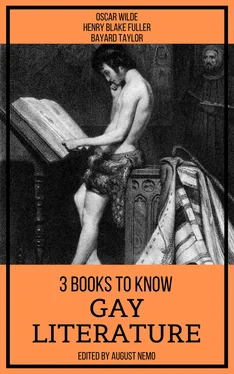“A great many, I fear,” she cried.
“Then commit them over again,” he said, gravely. “To get back one’s youth, one has merely to repeat one’s follies.”
“A delightful theory!” she exclaimed. “I must put it into practice.”
“A dangerous theory!” came from Sir Thomas’s tight lips. Lady Agatha shook her head, but could not help being amused. Mr. Erskine listened.
“Yes,” he continued, “that is one of the great secrets of life. Nowadays most people die of a sort of creeping common sense, and discover when it is too late that the only things one never regrets are one’s mistakes.”
A laugh ran round the table.
He played with the idea, and grew wilful; tossed it into the air and transformed it; let it escape and recaptured it; made it iridescent with fancy, and winged it with paradox. The praise of folly, as he went on, soared into a philosophy, and Philosophy herself became young, and catching the mad music of Pleasure, wearing, one might fancy, her wine-stained robe and wreath of ivy, danced like a Bacchante over the hills of life, and mocked the slow Silenus for being sober. Facts fled before her like frightened forest things. Her white feet trod the huge press at which wise Omar sits, till the seething grape-juice rose round her bare limbs in waves of purple bubbles, or crawled in red foam over the vat’s black, dripping, sloping sides. It was an extraordinary improvisation. He felt that the eyes of Dorian Gray were fixed on him, and the consciousness that amongst his audience there was one whose temperament he wished to fascinate, seemed to give his wit keenness, and to lend colour to his imagination. He was brilliant, fantastic, irresponsible. He charmed his listeners out of themselves, and they followed his pipe laughing. Dorian Gray never took his gaze off him, but sat like one under a spell, smiles chasing each other over his lips, and wonder growing grave in his darkening eyes.
At last, liveried in the costume of the age, Reality entered the room in the shape of a servant to tell the Duchess that her carriage was waiting. She wrung her hands in mock despair. “How annoying!” she cried. “I must go. I have to call for my husband at the club, to take him to some absurd meeting at Willis’s Rooms, where he is going to be in the chair. If I am late, he is sure to be furious, and I couldn’t have a scene in this bonnet. It is far too fragile. A harsh word would ruin it. No, I must go, dear Agatha. Good-bye, Lord Henry, you are quite delightful, and dreadfully demoralising. I am sure I don’t know what to say about your views. You must come and dine with us some night. Tuesday? Are you disengaged Tuesday?”
“For you I would throw over anybody, Duchess,” said Lord Henry, with a bow.
“Ah! that is very nice, and very wrong of you,” she cried; “so mind you come;” and she swept out of the room, followed by Lady Agatha and the other ladies.
When Lord Henry had sat down again, Mr. Erskine moved round, and taking a chair close to him, placed his hand upon his arm.
“You talk books away,” he said; “why don’t you write one?”
“I am too fond of reading books to care to write them, Mr. Erskine. I should like to write a novel certainly; a novel that would be as lovely as a Persian carpet, and as unreal. But there is no literary public in England for anything except newspapers, primers, and encyclopædias. Of all people in the world the English have the least sense of the beauty of literature.”
“I fear you are right,” answered Mr. Erskine. “I myself used to have literary ambitions, but I gave them up long ago. And now, my dear young friend, if you will allow me to call you so, may I ask if you really meant all that you said to us at lunch?”
“I quite forget what I said,” smiled Lord Henry. “Was it all very bad?”
“Very bad indeed. In fact I consider you extremely dangerous, and if anything happens to our good Duchess we shall all look on you as being primarily responsible. But I should like to talk to you about life. The generation into which I was born was tedious. Some day, when you are tired of London, come down to Treadley, and expound to me your philosophy of pleasure over some admirable Burgundy I am fortunate enough to possess.”
“I shall be charmed. A visit to Treadley would be a great privilege. It has a perfect host, and a perfect library.”
“You will complete it,” answered the old gentleman, with a courteous bow. “And now I must bid good-bye to your excellent aunt. I am due at the Athenæum. It is the hour when we sleep there.”
“All of you, Mr. Erskine?”
“Forty of us, in forty arm-chairs. We are practising for an English Academy of Letters.”
Lord Henry laughed, and rose. “I am going to the Park,” he cried.
As he was passing out of the door Dorian Gray touched him on the arm. “Let me come with you,” he murmured.
“But I thought you had promised Basil Hallward to go and see him,” answered Lord Henry.
“I would sooner come with you; yes, I feel I must come with you. Do let me. And you will promise to talk to me all the time? No one talks so wonderfully as you do.”
“Ah! I have talked quite enough for to-day,” said Lord Henry, smiling. “All I want now is to look at life. You may come and look at it with me, if you care to.”
––––––––

One afternoon, a month later, Dorian Gray was reclining in a luxurious arm-chair, in the little library of Lord Henry’s house in Mayfair. It was, in its way, a very charming room, with its high-panelled wainscoting of olive-stained oak, its cream-coloured frieze and ceiling of raised plaster-work, and its brickdust felt carpet strewn with silk long-fringed Persian rugs. On a tiny satinwood table stood a statuette by Clodion, and beside it lay a copy of ”Les Cent Nouvelles,” bound for Margaret of Valois by Clovis Eve, and powdered with the gilt daisies that Queen had selected for her device. Some large blue china jars and parrot-tulips were ranged on the mantel-shelf, and through the small leaded panels of the window streamed the apricot-coloured light of a summer day in London.
Lord Henry had not yet come in. He was always late on principle, his principle being that punctuality is the thief of time. So the lad was looking rather sulky, as with listless fingers he turned over the pages of an elaborately-illustrated edition of ”Manon Lescaut“ that he had found in one of the bookcases. The formal monotonous ticking of the Louis Quatorze clock annoyed him. Once or twice he thought of going away.
At last he heard a step outside, and the door opened. “How late you are, Harry!” he murmured.
“I am afraid it is not Harry, Mr. Gray,” answered a shrill voice.
He glanced quickly round, and rose to his feet. “I beg your pardon. I thought ——”
“You thought it was my husband. It is only his wife. You must let me introduce myself. I know you quite well by your photographs. I think my husband has got seventeen of them.”
“Not seventeen, Lady Henry?”
“Well, eighteen, then. And I saw you with him the other night at the Opera.” She laughed nervously as she spoke, and watched him with her vague forget-me-not eyes. She was a curious woman, whose dresses always looked as if they had been designed in a rage and put on in a tempest. She was usually in love with somebody, and, as her passion was never returned, she had kept all her illusions. She tried to look picturesque, but only succeeded in being untidy. Her name was Victoria, and she had a perfect mania for going to church.
“That was at ‘Lohengrin,’ Lady Henry, I think?”
Читать дальше













